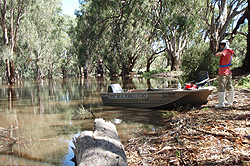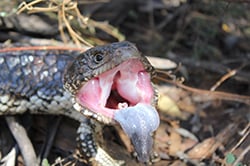Field trips
The Department of Environment and Genetics is committed to enhancing undergraduate teaching through field experience. Field courses in uniquely Australian locations are available as part of the department's second and third year subjects. They offer students an unrivalled learning experience.
Issues in Conservation - Wilsons Promontory
 When: Late February
When: Late February
Duration: 5 days
Visit one of Australia's oldest national parks to learn about issues in conservation biology and the management of protected areas.
Plant Diversity and Ecology - Natimuk

When: Late September, Semester 2
Duration: 5 days
An introduction to soil-vegetation relationships, survey methodology and plant identification based in the botanically diverse Wimmera region of Victoria.
Animal Physiology - Heron Island

When: Early-mid December
Duration: 7 nights on the island and 2 days in transit.
This field trip, now run by the Department of Animal, Plant and Soil Sciences, is a unique opportunity to gain insight into the physiology and behaviour of marine organisms, and appreciate the faunal diversity offered by coral reef systems.
Third Year Field Courses
Freshwater Ecosystems - Ovens River

Teaching Period: Weeks 4-12 (22 January - 22 March) 2024
When: Field Trip Sunday 18th – Friday 23rd February 2024
Duration: 6 days
Learn about Freshwater ecosystems including hydrology and biology, and undertake team based research in the field.
Mountain Ecosystems - Falls Creek

Teaching Period: Term 6
When: Early December
Duration: 6 days
Stay at Falls Creek and explore alpine and sub-alpine ecosystems in detail during daytime excursions. View our Mountain ecosystem video.
Field Zoology- The Mallee

When: Semester 2, Mid Semester Break, September
Duration: 6 days
Work in groups on research projects studying fauna such as pygmy possums, ants, geckos and honeyeaters.
